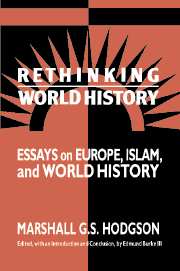Book contents
- Frontmatter
- Contents
- Editor's preface
- Introduction: Marshall G. S. Hodgson and world history
- Part I Europe in a global context
- Part II Islam in a global context
- 7 The role of Islam in world history
- 8 Cultural patterning in Islamdom and the Occident
- 9 The unity of later Islamic history
- 10 Modernity and the Islamic heritage
- Part III The discipline of world history
- Conclusion: Islamic history as world history: Marshall G.S. Hodgson and The Venture of Islam
10 - Modernity and the Islamic heritage
Published online by Cambridge University Press: 18 December 2009
- Frontmatter
- Contents
- Editor's preface
- Introduction: Marshall G. S. Hodgson and world history
- Part I Europe in a global context
- Part II Islam in a global context
- 7 The role of Islam in world history
- 8 Cultural patterning in Islamdom and the Occident
- 9 The unity of later Islamic history
- 10 Modernity and the Islamic heritage
- Part III The discipline of world history
- Conclusion: Islamic history as world history: Marshall G.S. Hodgson and The Venture of Islam
Summary
What can historical processes mean for the moral individual? In particular, what are the moral implications of the acceleration of the pace of historical change in modern times? Here I shall tackle only a few aspects of such questions; I shall deal with the acceleration of history as it confronts concerned Muslims in particular. But I refer to Muslims and not just as believers in a given creed, but rather as participants in a great cultural heritage prevalent in a wide part of the modern world. What I have to say about the case of the Muslims, will, I think, have some relevance for all moral individuals in our times.
I am discussing the concerned individual – the person who consciously attempts to bring to bear high cultural ideas, not only in the private life but in the society he is a part of. History sometimes seems to proceed almost independently of the hopes and the anguish of such people. ‘Yet they are, after all, the only ones worth discussing history seriously with; for they at least are paying attention to it in a morally responsible way. For that reason alone, their plight would be important to the historian. But in fact such people supply much of the flexibility of imagination and the richness of spirit which make possible such positive development as does come at points of challenge or of crisis, where otherwise there is too often mere blind floundering. Accordingly, their place in the historical process can be, on occasion, determinative.
- Type
- Chapter
- Information
- Rethinking World HistoryEssays on Europe, Islam and World History, pp. 207 - 244Publisher: Cambridge University PressPrint publication year: 1993



